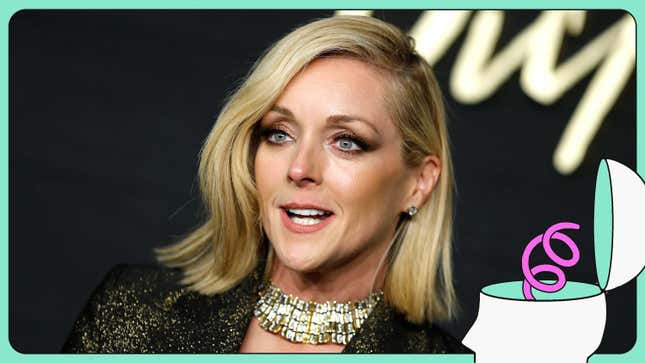Jenna Maroney Inherited the Earth
The spirit of 30 Rock’s shameless attention seeker is everywhere—from Shawn and Camilla to Dear Evan Hansen
Not So Deep Thoughts

Earlier this month, a clip from the UK dating show Love Trap went viral. In its early seconds, the video appeared to be standard reality TV fare—set design in 2004 McMansion chic, muscular bachelor standing next to a sympathetic host, an array of young women before him. Soon, one of these ladies will be giving a rueful exit interview as she says goodbye to the plaster palace. But instead of being passed over for a rose, the eliminated contestant falls through a trap door that opens beneath her feet. Even the main singleton, a hardened alum of Netflix’s Too Hot to Handle, appeared stunned.
The scene felt like a scrapped cutaway from 30 Rock, which devoted some of its most memorable gags to fake TV series with titles like “MILF Island” and “America’s Kidz Got Singing.” But in the years during and immediately following its seven season run, which ended in 2013, it seemed like Tina Fey’s Liz Lemon would be its most culturally enduring creation, the perfect avatar of upper-middle class liberal angst. The spirit of Liz Lemon was alive in every advanced degree holder bemoaning the difficulty of “adulting,” in every gripe about dresses that lack pockets. But the messy, relatable, workaholic of yesteryear now is now a dated elder millennial, righteously defending their side part. Lemon’s style of adorably anxious Cathy energy is out, and instead, it’s the shameless, tone-deaf spirit of Jane Krakowski’s Jenna Maroney that feels ubiquitous—on the big screen, on CringeTok, and in pop culture at large.
While Liz was a mountain of generational tics, she usually remained 30 Rock’s realistic, grounded center. Jenna Maroney, her best friend and the star of TGS, the sketch comedy show-within-the-show that the two the women created, was the absolute opposite—delusional and flighty, an endless cavern of needy antics. Constantly competing for airtime and attention with her more-famous co-star, Tracy Jordan, she faked illnesses, staged opportunities to showcase her vocals, and threatened suicide at the thought of the show adding another blonde woman to its cast. She’s only able to find love when she meets a drag performer (Will Forte) who specializes in Jenna Maroney impersonation. When Liz calls her out for being jealous of babies for their soft skin, Jenna adds that she also envies “how much attention they get.” She knows no dignity—after gaining a few pounds during TGS’s off season, she happily leans into the cruelty she now faces by adopting “me want food” as her catchphrase.
-

-

-

-

-

-

-

-

-

-

-

-

-

-

-

-

-

-

-

-

-

-

-

-

-

-

-

-

-

-

-

-

-

-

-

-

-

-

-

-








































